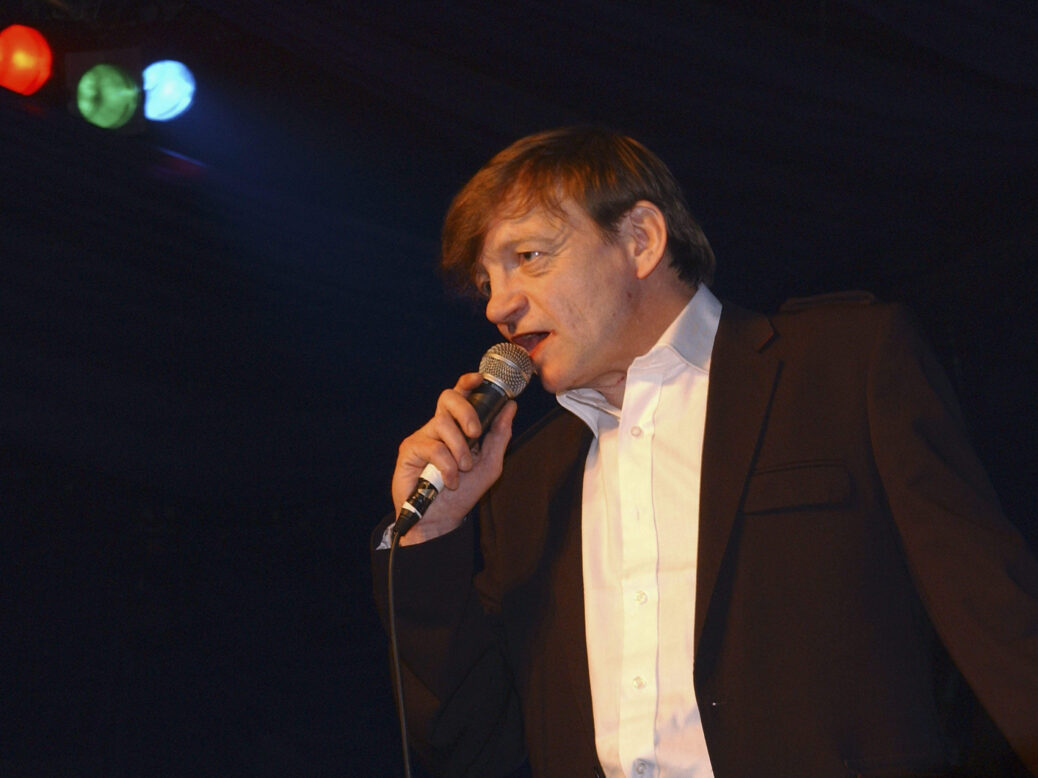
“The great thing about rock and roll is, any idiot can play it. The bad thing about rock and roll is, any idiot can play it.” Many personal recollections of Mark E Smith bubbled up on social media when the death of this singular figure – tyrannical owner-operator and sole permanent component of The Fall, most curmudgeonly man in pop, and possibly the last member of the punk generation still engaged in intellectual jihad against sonic acceptability – was announced on January 24. But these lines, half-remembered by ex-WYNU DJ Hugh Foley from his interview with Smith in the 1980s, said it best, I thought. Though The Fall grew out of punk’s DIY anti-elitism they repudiated its anti-intellectualism with venom. The group (never “band”, Smith always insisted) could sound simple, basic, dumb even, but they emphatically weren’t. They – Smith – contained multitudes.
A working class autodidact from Prestwich in Bury with a mind wired differently both by nature and a prodigious consumption of alcohol and speed, Smith would employ the lumpen brutality of pre-Beatles rock and roll plus Krautrock’s mind-dissolving repetition to deliver a dense cross-cultural payload. In this endeavour, the group made successive generations of supposedly alternative rock appear craven and illiterate. Ezra Pound and Wyndham Lewis, European football and Doris Stokes, CB radio, Jabberwocky, Lee ‘Scratch’ Perry, DC comics and of course Albert Camus: it was all there if you could find it, accompanied by ever-shifting musicians who might sound like Link Wray one year or a malfunctioning ZX Spectrum the next.
This was not easy-access stuff. Like any music which changes you, The Fall are on first listen unlistenable. You must conquer your terror and take a couple of runs at it. Once you’ve broken through the membrane, little else will do. This is what their great advocate John Peel meant when he said that The Fall are the group against which all others must measure themselves. Not that they should all sound like The Fall, though many have tried, but that they should try to do what The Fall did. They should try to become something entirely of themselves.
The wonderful and frightening world that Smith built over four decades can therefore be enjoyed in several different dimensions. His inimitable song titles alone were entertainments, offering elliptical social commentary (from “Lie Dream Of A Casino Soul” and “Mere Pseud Mag Ed” up to “Quit iPhone”) and bewildering urban surrealism (“Das Vulture Ans Ein Nutter-Wain”? “Noel’s Chemical Effluence”? ‘Mollusc In Tyrol”?) and in one significant case (“Prole Art Threat”) the group’s own three-word mission statement.
As a lyricist, Smith could veer from the Lovecraftian cosmic horror of “Impression Of J Temperance” (“The new born thing hard to describe/Like a rat that’s been trapped inside/A warehouse space near a city tide”) to the absurdist comedy of reciting a weekend colour supplement interview with Pete Tong in which the DJ lists all the things he can’t leave home without (“Sunglasses… Palm Pilot… Amex card… I was in the realm of the essence of Tong”). Undercutting his visions of modern purgatory with demotic humour – he always insisted against all visible evidence that Fall fans were miners and postmen not students and Guardian readers – Smith wrote like a vorticist Les Dawson, gazing through the hole in the outside lavvy roof at the abyssal horrors beyond, simultaneously funny and terrifying. Yet in lovely songs such as “Bill Is Dead” or “Edinburgh Man” he could exhibit a scarcely comprehensible tenderness.
And then there was the marginalia, the compressed idea bombs and nanofestos scribbled on Smith’s handmade record sleeves and adverts: “ANTI-THE GROUP ‘QUEEN’ TYPE SOUND” or “IS THIS LP SUFFICIENTLY COFFEE TABLE?” or, demonstrating precognitive powers re. Brexit on the cover of 1982 album Hex Enduction Hour, “CUSHY E.E.C. EURO STATE GOALS”. In a pre-digital age these were there to be pored over, like a Morrissey one-liner or a Kierkegaard quote on a Frankie Goes To Hollywood sleeve. An inveterate bullshitter, Smith frequently claimed to have invented everything from rap to the Internet. If so, he invented the tweet as well.
The caricature of Smith as a brutal martinet, however, held more than a grain of truth. Famously over 60 musicians including wives and girlfriends were hired and fired in the course of The Fall’s existence, one by being abandoned beside a freeway during a snowstorm. Another entire line-up, including loyal long-sufferers Karl Burns and Steve Hanley, was fired onstage during a shambolic show in New York in 1998. This incident shone a light on Smith’s least attractive qualities; he was later charged with assault and ordered to undergo alcohol treatment for attacking his girlfriend, keyboard player Julia Nagle.
Neither was his decline over the past decade a cheering sight. Fall shows became increasingly unpredictable and dispiriting in the 21st century, notably their 2015 Glastonbury appearance in which a disoriented Smith appeared to have pissed himself onstage. By 2017 he was visibly ill, bloated and performing from a wheelchair. Throat and respiratory problems meant the cancellation of a US tour. And yet somehow a new Fall album would come out every other year and there would always be a gem on it. “Fol De Rol” from last year’s “New Facts Emerge” was as basic, euphoric and brilliant as ever.
It is a commonplace to say of the departed that there will never be another. But there can never be another Mark E. Smith. The circumstances of productive boredom and limited horizons that gave him his vocation have gone and will not return. You can however hear Smith in everything from Franz Ferdinand to LCD Soundsystem to 2018’s Cabbage and Shame. “Life should be full of strangeness, like a rich painting,” Smith sang in “How I Wrote “Elastic Man”. Now it is less rich and less strange.



